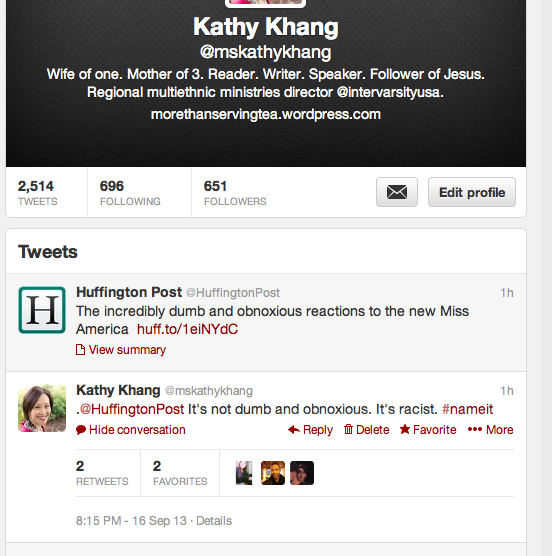
Huffington Post calls comments about Miss America “dumb” and “obnoxious”. Let’s call it what it really is. Racist.
***Let’s be clear about this, dear readers. The reaction to Nina Davuluri is not dumb or obnoxious, as The Huffington Post would have us believe. It is racist. Don’t tell me it’s just a stupid beauty pageant because that doesn’t make it better or OK or less racist or problematic. Please don’t suggest that the comments may only reflect a minority of Americans. This past December, 77% of Americans identified as Christian. So, if the racist comments are coming from the 23% of Americans who don’t identify as Christians, we Christians should be a wee bit more vocal when this kind of very un-Jesus behavior rears its ugly head. God help us all if any of the comments come from the 77% – the majority, who identify as Christian.
You may now go back to your regularly scheduled reading. Thank you.***
We all have a lot of work to do. It’s Monday morning, and I am just finding the top of my desk.
But this can’t wait because none of us should wake up to racist bull on a Monday.
I have not watched a Miss America pageant in decades. I have never been in a beauty pageant, though many of my mother’s friends suggested I ought to try my hand at the Miss Korea pageant because back when I was young the art of blepharoplasty had not yet been perfected and culturally accepted. Back when I was young Miss America was always about the blonde, blue-eyed beauty winning. It was just like high school.
This morning my twitter feed and FB page had many, many posts about the new Miss America. Nina Davuluri, Miss New York, was crowned Miss America. Davuluri is the first Miss America winner of Indian descent. The first runner-up was Miss California, Crystal Lee, also not White. They are incredibly bright, talented, and beautiful women because beyond the bikinis these women also have brains. And because Davuluri is both beautiful and bright, she can’t win. We are uncomfortable with the idea that a bright woman can also be incredibly beautiful and, gasp, sexy. She can strut her bikini body and head to medical school.
More power to her.
But what really stinks is the racist, hateful, ignorant garbage being thrown out there about our Miss America by Americans because she is brown. Please note that many of the tweets and comments are by younger White Americans who have grown up in a post-Civil Rights, post-Voting Rights Act, post-racial America because see we voted a Black American into our highest office not once but twice. These younger White Americans are supposedly more informed, more open, more accepting, less politically correct, less racist, less insensitive, more connected via the World Wide Web.
Some of these people think she is Arab. Um. She’s American. She is not from Western Asia or North Africa. She is from New York.
Here’s the kicker. As a Christian Asian American woman who grew up in the Midwest, I grew up assuming Eve, Queen Esther, Ruth, Rachel, Mary, Martha, the bleeding woman, the sinful woman, the woman at the well, and all the other women of the Bible, the beautiful, godly women I should aspire to were like Barbie and Miss America – white, blonde and beautiful. And why wouldn’t I have thought that with all of the felt storyboard Bible images, the child-friendly Bibles with pictures of a blonde Jesus and fair-skinned children at his feet, and the blonde Jesus picture so many of us Korean American Christian families had hanging up in our homes. (We had two – one portrait-style and one of Jesus standing at a door.)
I hope and pray none of the racist comments are also coming from Christians who are White Americans. I hope and pray the racist comments aren’t coming from people who believe America belongs to Christians, not Arabs or Muslims because the two are interchangeable. (Not.)
I hope and pray the racist vitriol breaks your heart.
It should break every American and every Christian’s heart because racism should be un-American and hating your neighbor from New York is un-Christian.